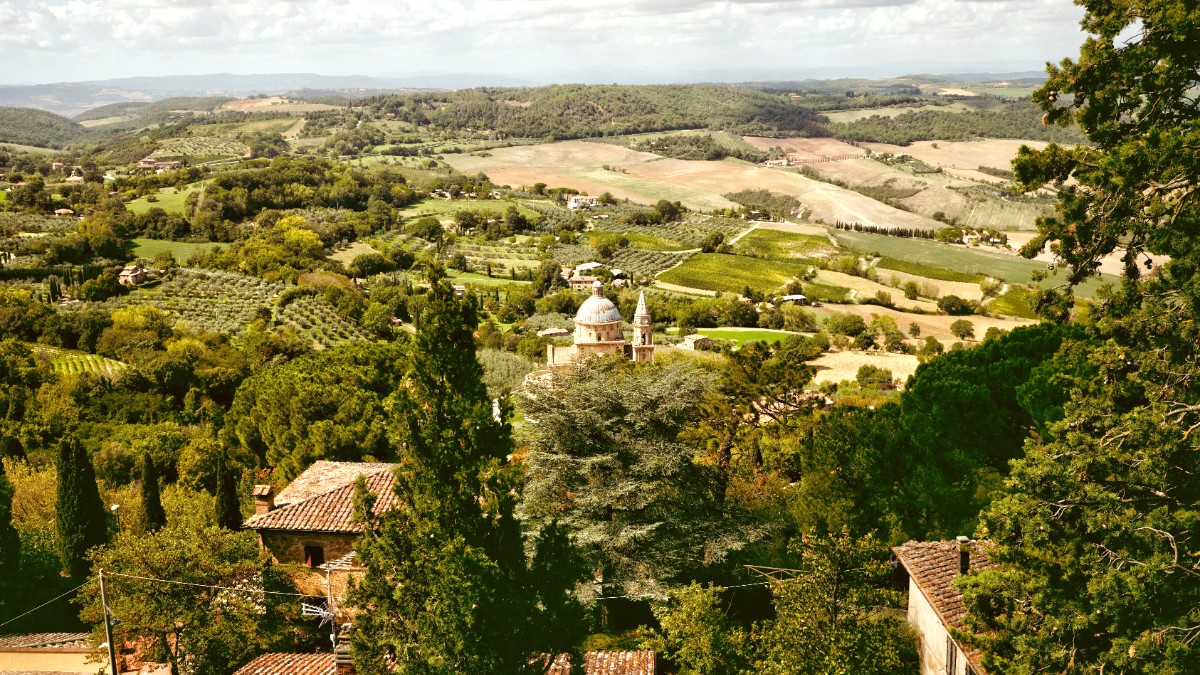
Tuscany, Italy
Wander through its ancient streets, explore hidden cellars, and take in panoramic views of the Tuscan countryside, characterized by rolling hills, vineyards, and olive groves.
Montepulciano boasts roots dating back to the Etruscan period, though its most noteworthy development occurred during the Middle Ages and the Renaissance. Its strategic position led to frequent conflicts between Siena and Florence, with the town eventually aligning with Florence and experiencing a golden age of artistic and architectural flourish.
Many of its impressive palaces, churches, and public buildings stem from this Renaissance period, showing the work of prominent architects like Antonio da Sangallo the Elder.
Montepulciano sits in the southern part of Tuscany, within the province of Siena. It is approximately 60 kilometers (37 miles) southeast of Siena and about 100 kilometers (62 miles) southeast of Florence. The town is perched on a hill, providing commanding views of the surrounding Val d'Orcia and Val di Chiana valleys.
The region around Montepulciano epitomizes the classic Tuscan landscape. Expect to see cypress-lined avenues, golden wheat fields, sprawling vineyards, and ancient olive groves. The area is dotted with other charming hill towns, hot springs, and natural reserves, making it a prime location for scenic drives and outdoor exploration.
A UNESCO World Heritage site known for its iconic rolling hills.
A "perfect Renaissance town" and home to Pecorino cheese.
Another hill town renowned for its Brunello di Montalcino wine.
Famous for its thermal baths and wellness resorts.
The fourth largest lake in Italy, with charming lakeside villages.
Montepulciano's history is deeply intertwined with Tuscany's broader narrative. Its Etruscan origins predate Roman times, and early Christian communities existed here. The medieval period saw the rise of a powerful independent commune, often caught between the rivalries of Siena and Florence.
The 16th century, under Florentine Medici rule, brought significant artistic and economic prosperity, evident in the numerous grand palaces and the impressive Piazza Grande that crown the town.
The town's architecture showcases a transition from medieval fortresses to elegant Renaissance palaces. The Duomo, Palazzo Comunale (Town Hall), and various noble residences display the artistic prowess of the era. Below the town, a network of underground cellars forms an ancient city of wine storage.
Montepulciano maintains a lively cultural scene throughout the year. Annual events like the Bravìo delle Botti (a barrel rolling race) in August and the Cantiere Internazionale d'Arte (International Art Workshop) in July draw visitors and locals alike, celebrating the town's traditions and artistic spirit.
Montepulciano is not just a destination; it is an experience, inviting visitors to immerse themselves in the authentic charm of Tuscan life.
Montepulciano, a jewel of Tuscany, beckons with its captivating blend of art, history, and the finest wines. This overview presents aspects of the town at a glance.
Its elevated position provides breathtaking vistas, making it a favorite for photographers and those seeking tranquility.
Rolling hills, vineyards, and olive groves characterize the stunning Tuscan scenery surrounding the town.
Warm and welcoming locals contribute to a pleasant and authentic travel experience.
Montepulciano is famous worldwide for its prestigious Vino Nobile, offering numerous tasting opportunities.
Here are some details about Montepulciano for quick reference.